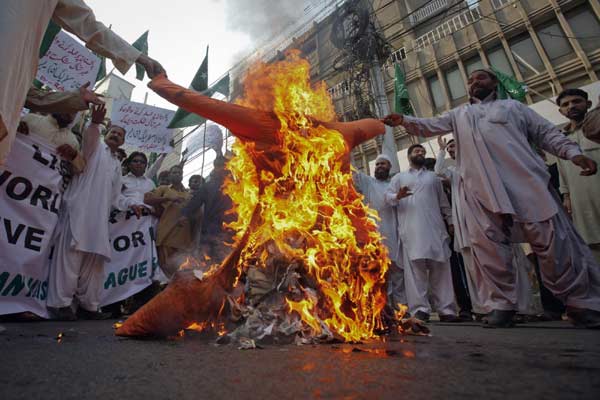Rage grips Pakistan over NATO attack
 0 Comment(s)
0 Comment(s) Print
Print E-mail
China Daily via Agencies, November 28, 2011
E-mail
China Daily via Agencies, November 28, 2011
Fury spread in Pakistan Sunday over a NATO cross-border air attack that killed 24 Pakistani soldiers and could undermine the U.S. effort to wind up the war in Afghanistan.
 |
|
Protestors, who are demonstrating against a NATO cross-border attack, burn an effigy representing the U.S. in Karachi November 27, 2011. [Photo/Agencies] |
Sunday night in Pakistan, more than 40 hours after the incident, many questions remained.
NATO described the killings as a "tragic unintended incident" and said an investigation was underway. A Western official and an Afghan security official who requested anonymity said NATO troops were responding to fire from across the border.
It's possible both explanations are correct: that a retaliatory attack by NATO troops took a tragic, mistaken turn in harsh terrain where identifying friend and foe can be difficult.
"All of this is extremely murky and needs to be investigated," said a U.S. official in Washington, who spoke on condition of anonymity. "Our goal today is ... that the investigation gets mounted in a way that is confidence-building on all sides."
Militants often attack from Pakistani soil or flee after combat across a porous border that NATO-led troops, under their United Nations mandate, cannot cross.
What is clear is the incident could undermine U.S. efforts to improve ties with Pakistan so that the regional power helps stabilise Afghanistan before NATO combat troops go home by the end of 2014.
The attack was the latest perceived provocation by the United States, which infuriated Pakistan's powerful military with a unilateral special forces raid that killed al Qaeda leader Osama bin Laden in May.
Thousands gathered outside the American consulate in the city of Karachi to protest against the NATO attack.
A Reuters reporter at the scene said the angry crowd shouted "Down with America." One young man climbed on the wall surrounding the heavily fortified compound and attached a Pakistani flag to barbed wire.
"America is attacking our borders. The government should immediately break ties with it," said Naseema Baluch, a housewife attending the demonstration. "America wants to occupy our country but we will not let it do that."
Pakistan buried the troops killed in the attack Sunday. Television stations showed coffins draped in green and white Pakistani flags in a prayer ceremony at the headquarters of the regional command in Peshawar, attended by army chief General Ashfaq Kayani.
Around 40 troops were stationed at the outposts at the time of the attack, military sources said.
Militants targeting NATO forces have long taken advantage of the fact that the alliance's mandate ends at the border to either attack from within Pakistan or flee to relative safety after an attack.
Three Pakistani soldiers were killed last year by NATO gunships. NATO said then that its forces had mistaken warning shots from Pakistani forces for a militant attack.
In the latest incident, a Western official and a senior Afghan security official said NATO and Afghan forces had come under fire from across the border with Pakistan before NATO aircraft attacked a Pakistani army post, killing the soldiers.
"They came under cross-border fire," the Western official said, without identifying the source of the fire.
The Afghan official said troops had come under fire from inside Pakistan as they were descending from helicopters, which had returned fire.
Both officials asked not to be named because the attack is so sensitive.
Pakistan has said the attack was an unprovoked assault and has said it reserves the right to retaliate.





